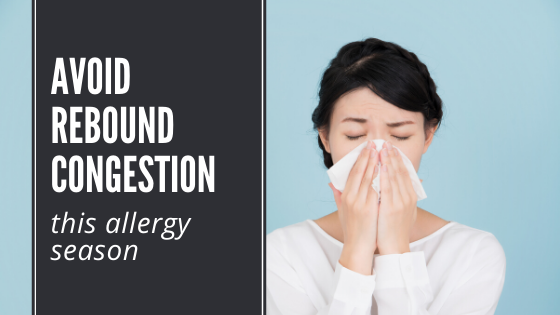
Allergy season is blooming with every flower that pops its head from the dirt. Before you reach for your nasal spray, consider whether rebound congestion may be causing your allergy congestion to last longer than it should.
Allergies inflame the blood vessels in your nasal passages. Nasal decongestion sprays such as Afrin reduce the swelling and allow you to breathe again. Ah, sweet relief.
These sprays reduce the amount of blood flowing to these vessels. In response, it may cause those vessels to work harder to restore the blood flow. This overcompensation causes more swelling in your nose and more congestion, which often leads to using more nasal spray.
Nasal decongestant sprays include over-the-counter sprays such as Oxymetazoline hydrochloride (Afrin, Dristan, Sinex) and phenylephrine hydrochloride (Neo-Synephrine). Doctors suggest using these sprays for a maximum of three days. They also suggest using the minimum number of doses per day to reduce the chances you’ll develop rebound congestion.
What about other nose sprays?
Steroid nose sprays such as budesonide (Rhinocort Allergy), fluticasone (Flonase Allergy Relief), and triamcinolone (Nasacort Allergy 24HR) do not work the same way as decongestant sprays and may be used for years without rebound congestion. These sprays have their own set of side effects such as headache, nosebleed, sore throat or cough. These sprays work well to reduce the symptoms of allergies, but it can take up to a week to notice the effects. If you suffer from allergies frequently, talk to your provider about starting this type of nose spray when the season changes.
What other remedies can you use?
Outside of medicine, you can do a lot to relieve the symptoms of seasonal allergies. Saline nasal sprays and neti pots are natural, safe ways to help manage your symptoms. The neti pot flushes mucus and allergens from the nose. A note of caution though, be sure to use sterilized water and clean them well to avoid serious infections.
In short, don’t discount the help a nasal decongestant may provide as a short term solution to seasonal allergies. Just make sure you pair it with a longer-term solution. If you’ve been using these nose sprays too often for too long make an appointment with your provider to find relief from your congestion.


Speak Your Mind